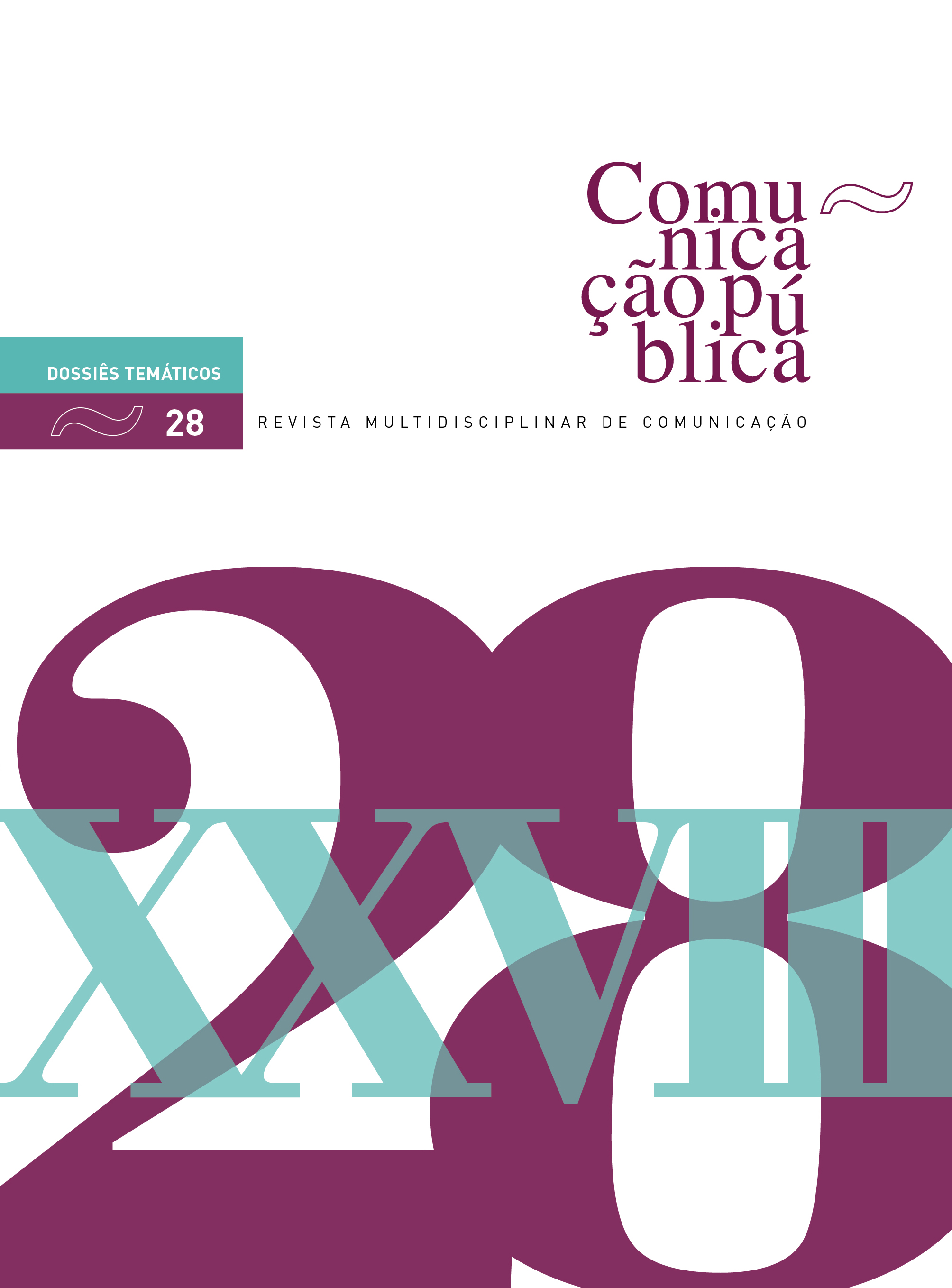Uniting media literacy and information literacy in the era of disinformation
skills to deal with fake news
DOI:
https://doi.org/10.4000/cp.6143Keywords:
media literacy, information literacy, fake news, evaluation of information sourcesAbstract
This work develops criteria for analyzing informational and media content, considering two areas of literacy, the media and information literacy, as relevant to the fight against fake news. Through a literature review, a program with three guiding axes for content evaluation is proposed, considering the necessary skills involved in each axis. It is noteworthy that the preparation of more critical individuals to deal with the era of disinformation involves not only the criteria of judgment that classify content as false or true, but a critical analysis of the context in which such content was produced, the economic, political and ideological interests of those who produce, as well as the language put to manipulate the information, and the understanding of the behavior of audiences that reinforce this type of consumption of false news.
Downloads
References
Almeida, L. B. C. (2009). Conceitos-chave e estratégias pedagógicas: Material para mídia-educação. Disponível em: https://ligiabeatriz.wordpress.com/conceitos-chave-e-estrategias-pedagogicas/ (Acedido 20 agosto 2018).
Bauer, T. (2012). Beyond and after media literacy: Media competence building. São Paulo: Faculdade Cásper Líbero.
Borges, J., & Oliveira, L. (2011). Competências infocomunicacionais em ambientes digitais. Observatorio (OBS*) Journal, 5(4), 291-326.
Bounegru, L., Gray, J., Venturini, T., & Mauri, M. (2018). A field guide to "fake news" and other information disorders. Amsterdam: Public Data Lab. http://doi.org/10.5281/zenodo.1136272
Buckingham, D. (2003). Media education: Literacy, learning and contemporary culture. Cambridge: Polity Press.
Buckingham, D. (2006). Defining digital literacy: What do young people need to know about digital media? Nordic Journal of Digital Literacy, 1, 263-277.
Buckingham, D. (2019). The media education manifesto. Cambridge: Polity Press.
Burke, P. (2002). Problemas causados por Gutenberg: A explosão da informação nos primórdios da escrita. Estudos Avançados, 16(44), 173-185.
Canabarro, D. R. (2018, 6 setembro). Para além das “fake news”: os componentes da chamada “desordem informacional”. Observatório da Internet no Brasil. Disponível em: https://observatoriodainternet.br/post/para-alem-das-fake-news-oscomponentes-da-chamada-desordeminformacional (Acedido 24 fevereiro 2019).
Darton, R. (2017). A verdadeira história das notícias falsas. El País. Disponível em: https://brasil.elpais.com/brasil/2017/04/28/cultura/1493389536_863123.html (Acedido 24 fevereiro 2019).
Dudziak, E. A. (2003). Information literacy: Princípios, filosofia e prática. Ciência da Informação, 32(1), 23-35.
Dudziak, E. A. (2010). Competência informacional e midiática no ensino superior: Desafios e propostas para o Brasil. Prisma: Revista de Ciências e Tecnologias de Informação e Comunicação, 13, 1-19.
Eshet-Alkalai, Y. (2004). Digital literacy: A conceptual framework for survival skills in the digital era. Journal of Educational Multimedia and Hypermedia, 13(1), 93-107.
Fantin, M. (2014). Contextos, perspectivas e desafios da mídia-educação no Brasil. In I. Eleá (Org.), Agentes e vozes: Um panorama da mídia-educação no Brasil, Portugal e Espanha (pp. 49-57). Götenburg: Nordicon.
Federación Internacional de Asociaciones de Bibliotecarios y Bibliotecas (IFLA, 2014). Recomendaciones de la Federación Internacional de Asociaciones de Bibliotecarios y Bibliotecas (IFLA) sobre alfabetización informacional y mediática. Disponível em: http://www.ifla.org/files/assets/information-literacy/publications/media-infolitrecommendes.pdf (Acedido 3 maio 2015).
Hesmondhalgh, D. (2006). Bourdieu, the media and cultural production. Media, Culture & Society, London, 28(2), 211-231. https://doi.org/10.1177/0163443706061682
Jenkins, H. (2009). Cultura da convergência. São Paulo: Aleph.
Klayman, J. (1995). Varieties of confirmation bias. Psychology of Learning and Motivation, 32, 385-418.
Leaning, M. (2014). Towards the integration of media and information literacy: A rationale for a 21st century approach. In B. S. Abreu & P. Mihailidis (Eds.), Media literacy education in action: Theoretical and pedagogical perspectives (pp. 97-104). London: Routledge.
Lee, A.Y.L., & So, C. Y. K. (2014). Media literacy and information literacy: Similarities and differences. Comunicar, XXI(42), 137-145.
Lévy, P. (2003). A inteligência coletiva: Por uma antropologia do ciberespaço (4ªed.). São Paulo: Loyola.
Lusted, D. (1991). The media studies book: A guide for teachers. London: Routledge.
Nickerson, R. S. (1998). Confirmation bias: A ubiquitous phenomenon in many guises. Review of General Psychology, 2(2), 175-220.
Romani, J. C. C. (2009). Strategies to promote the development of e-competencies in the next generation of professionals: European and international trends. Cardiff: Cardiff University.
Santos, P. L. V. A. C., & Carvalho, A. M. G. (2009) Sociedade da informação: Avanços e retrocessos no acesso e no uso da informação. Informação & Sociedade: Estudos, 19(1), 45-55.
Siqueira, A. B. (2008). Educação para a mídia: Da inoculação à preparação. Educação e Sociedade, 29(105), 1043-1066.
Siqueira, A. B. (2014). Mídia-educação a serviço da cidadania: Uma proposta para a formação de assistentes sociais. In A. X. N. Macedo, D. U. B. S. Pires, & F. (Orgs.), Cadernos de debate da classificação indicativa: Educação para a mídia (Vol. 5, pp. 53-69). Brasília: Ministério da Justiça/ Secretaria Nacional de Justiça.
Tomaél, M. I., Alcará, R. A., & Silva, T. E. (2008). Fontes de informação na internet: Critérios de qualidade. In M. I. Tomaél (Org.), Fontes de informação na internet. Londrina: Editora da Universidade Estadual de Londrina.
Tomaél, M. I. et. al. (2009). Fontes de informação na internet: critérios de qualidade. In: TOMAÉL, Maria Inês (Org.). Fontes de informação na internet. Londrina: EDUEL.
Vitorino, E. V., & Piantola, D. (2009). Information literacy - historical and conceptual bases: constructing meanings. Ciência da Informação, 38(3), 130-141.
Wilson, C., Grizzle, A., Tuazon, R., Akyempong, K., & Cheung, C.-K. (2013). Alfabetização midiática e informacional: Currículo para formação de professores. Brasília: Unesco/ UFMT.
Wineburg, S., McGrew, S., Breakstone, J., & Ortega, T. (2016). Evaluating information: The cornerstone of civic online reasoning. Stanford Digital Repository. Disponível em: http://purl.stanford.edu/fv751yt5934
Wolton, D. (2006). É preciso salvar a comunicação. Casal de Cambra: Caleidoscópio.
Downloads
Published
Issue
Section
License
Copyright (c) 2020 Direitos do Autor (c) 2020

This work is licensed under a Creative Commons Attribution-NonCommercial 4.0 International License.
Os conteúdos da Comunicação Pública estão licenciados com uma licença Creative Commons - Atribuição-NãoComercial 4.0 Internacional.


